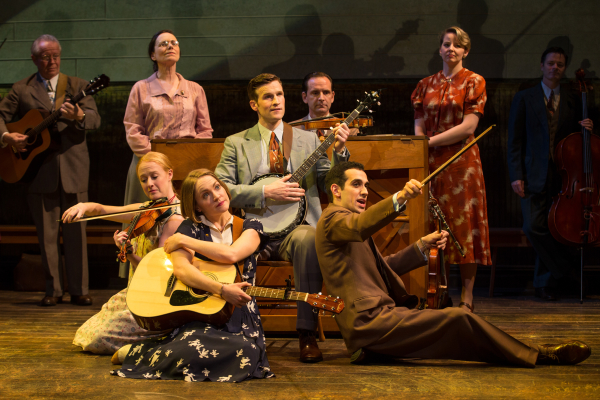Allegro

(© Matthew Murphy)
First seen on Broadway in 1947, Allegro was the third theatrical collaboration between Richard Rodgers and Oscar Hammerstein II. Allegro didn't enjoy the runaway success of Oklahoma! or the unanimous critical acclaim of Carousel, and has since languished in relative obscurity. Die-hard fans will claim that this epic coming-of-age tale (which borrows more than a few pages from German playwright/director Bertolt Brecht) was ahead of its time, an underappreciated gem just waiting to take its position in the pantheon of great musicals. Yet in a new revival at Classic Stage Company, it's hard to see Allegro as anything but dated.
This is especially apparent under the direction of John Doyle, whose actor-as-musician stagings (like the brilliant 2005 Broadway revival of Sweeney Todd) regularly garner fresh and exciting insights from older works. (Who could forget Patti LuPone's tuba-playing Mrs. Lovett?) Not so with Allegro, suggesting that stripped-down to its essentials, there's just not much to draw on from Hammerstein's shallow book.
The story charts the path of Dr. Joseph Taylor Jr. (Claybourne Elder) from birth to midlife crisis. The costumes and actors never change in this bildungsroman-like story, meaning we have to endure the always-awkward stage conceit of a grown man playing a baby. With the help of a meddlesome Greek chorus, this infant in suspenders and argyle socks meets his dad (Malcolm Gets), mom (Jessica Tyler Wright), and grandma (Alma Cuervo). Joe wants to be a small-town doctor, just like dad, but his girlfriend, Jenny (Elizabeth A. Davis), has other plans. When girlfriend becomes wife, she pressures Joe to take a high-paying job in Chicago catering to rich hypochondriacs. Spiritually floundering in material success, Joe wonders how his life so radically diverged from his childhood aspirations.
But we never wonder. The culprit is obviously his evil wife. Jenny is like Lady Macbeth, but less charming. As portrayed by Davis, she has an icy gaze that makes the white walkers of Game of Thrones seem like cuddly teddy bears. The women of Allegro run the gamut from matronly to silly to downright sociopathic. None of them seem quite human, lending to the proceedings a whiff of misogyny.
Granted, Doyle has done some significant cutting to fit this gigantic musical into 90 minutes. Perhaps he removed some of the nuance from these two-dimensional characters (but I doubt it). Hammerstein's modern-day morality play generally eschews ambiguity for bold-type lessons: Don't trust your gold-digging wife to make family decisions.
While original director Agnes de Mille used a cast of 67 to tell Rodgers and Hammerstein's story, Doyle does it with just 14. They act, sing, dance, play, and at one point masochistically spin around to the point of dizziness. While most of the performances are adequate, a few stand out: As Joe's friend Charlie, George Abud wows us with his crisp diction and retro vibe. It's like he stepped out of a black-and-white talkie. As nurse Emily, Jane Pfitsch makes the room sizzle with the score's one memorable song, the jazzy Kurt Weill knockoff "The Gentleman Is a Dope." Pfitsch's angry trumpeting is the highlight of the show.
Lighting designer Jane Cox bathes the stage in a creepy Brechtian glow, casting dark shadows and making the actors' faces look pale and sunken. It all feels more like Weimar Germany than small-town America. Occasionally the houselights come up so the actors can tell us how this story relates to our lives (à la Brecht).
Unfortunately, Rodgers and Hammerstein's most experimental show just happens to be their most boring, suffering from both an unremarkable score and a predictable story. And while it may have been a novelty for Broadway, it's hard to claim any kind of form-pushing theatrical legacy for Allegro. No amount of time, perspective, or auteur direction can change that. Rodgers and Hammerstein were undeniably geniuses of musical theater, but even geniuses have their flops.










